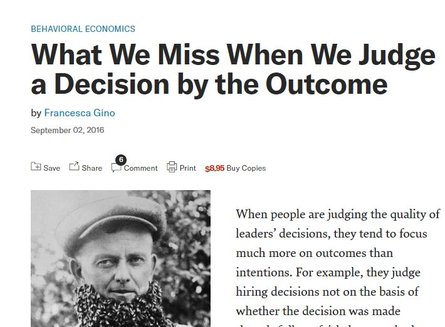
When people are judging the quality of leaders’ decisions, they tend to focus much more on outcomes than intentions. For example, they judge hiring decisions not on the basis of whether the decision was made thoughtfully or fairly but on whether the new employee performs well. They judge the quality of a product decision on whether the product was well received in the market, rather than the quality of the process that led to the decision in the first place.
As it turns out, this tendency affects virtually all human beings. When evaluating others’ actions, most people focus more on the outcome of decisions than on intentions, a phenomenon that psychologists call outcome bias. A decision — such as taking time to review an employee’s performance data and provide feedback carefully — is often judged to be lower in quality when it leads to a poor, rather than a good, outcome.